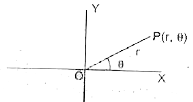A line OA of length r starts from its initial position OX and traces an angle AOB = in the anitclockwise direction. It then traces back in the clockwise direction an angle BOC = ( where ). L is the foot of the perpendicular from C on OA. Also,
is equal to
The correct Answer is:D

So,
Now
...(1)
...(2)
From (1) and (2), we get
Topper's Solved these Questions
- TRIGONOMETRIC RATIOS AND TRANSFORMATION FORMULASBOOK - CENGAGE PUBLICATIONCHAPTER - TRIGONOMETRIC RATIOS AND TRANSFORMATION FORMULASEXERCISE - Exercise (Matrix Match Type )
9 Videos
- TRIGONOMETRIC RATIOS AND TRANSFORMATION FORMULASBOOK - CENGAGE PUBLICATIONCHAPTER - TRIGONOMETRIC RATIOS AND TRANSFORMATION FORMULASEXERCISE - Exercise (Numerical Value Type )
38 Videos
- TRIGONOMETRIC RATIOS AND TRANSFORMATION FORMULASBOOK - CENGAGE PUBLICATIONCHAPTER - TRIGONOMETRIC RATIOS AND TRANSFORMATION FORMULASEXERCISE - Exercise (Multiple Correct Answer Type)
22 Videos
- TRIGONOMETRIC FUNCTIONS BOOK - CENGAGE PUBLICATIONCHAPTER - TRIGONOMETRIC FUNCTIONS EXERCISE - SINGLE CORRECT ANSWER TYPE
38 Videos
- TRIGONOMETRIC RATIOS FOR COMPOUND, MULTIPLE, SUB-MULTIPLE ANGLES, AND TRANSFORMATION FORMULAS BOOK - CENGAGE PUBLICATIONCHAPTER - TRIGONOMETRIC RATIOS FOR COMPOUND, MULTIPLE, SUB-MULTIPLE ANGLES, AND TRANSFORMATION FORMULAS EXERCISE - Multiple Correct Answers Type
6 Videos
Similar Questions
A line OA of length r starts from its initial position OX and traces an angle AOB = α in the anitclockwise direction. It then traces back in the clockwise direction an angle BOC = 3θ ( where α>3θ). L is the foot of the perpendicular from C on OA. Also, sin3θCL=cos3θOL=1
2r2−1r is equal to
View Solutionsin(3θ+α)+sin(3θ−α)+sin(α−θ)−sin(α+θ)=cosα
View Solution
Knowledge Check
A line OA of length r starts from its initial position OX and traces an angle AOB = α in the anitclockwise direction. It then traces back in the clockwise direction an angle BOC = 3θ ( where α>3θ). L is the foot of the perpendicular from C on OA. Also, sin3θCL=cos3θOL=1
1−rcosαrsinα is equal toAtan2θBcot2θCsin2θDsin2θA line OA of length r starts from its initial position OX and traces an angle AOB = α in the anitclockwise direction. It then traces back in the clockwise direction an angle BOC = 3θ ( where α>3θ). L is the foot of the perpendicular from C on OA. Also, sin3θCL=cos3θOL=1
2r2−1r is equal toAsinαBcosαCsinθDcosθLet OP=rand∠XOP=θ then the position of P in polar coordinate system is represented by (r,θ) OX and O are called the initial line and pole respectively.
If p be the length of perpendicular from origin to line and if α is the angle which the perpendicular to the line makes with the initial line . The equation of line is given by r cos(θ−α)=p

The polar coordinates of the foot of perpendicular from the pole on the line joining the two points (r1,θ1)and(r2,θ2) areA⎡⎢ ⎢⎣r1r2sin(θ2−θ1)√r21+r22−2r1r2cos(θ1−θ2),tan−1(r1cosθ1−r2cosθ2r2sinθ2−r1sinθ2)⎤⎥ ⎥⎦B⎡⎢ ⎢⎣r1r2sin(θ2+θ1)√r21+r22−2r1r2cos(θ1−θ2),tan−1(r1cosθ1−r2cosθ2r2sinθ2−r1sinθ1)⎤⎥ ⎥⎦C⎡⎢ ⎢⎣−r1r2sin(θ2−θ1)√r21+r22−2r1r2cos(θ1−θ2),tan−1(r1cosθ1−r2cosθ2r2sinθ2−r1sinθ1)⎤⎥ ⎥⎦Dnone of these
If sinθ+sin2θ+sin3θ=sinα and cosθ+cos2θ+cos3θ=cosα , then θ is equal to
View SolutionA line makes an angle θ with the x-axis and the y-axis. If it makes an angle α with the z - axis such that sin2α=3sin2θ, then cos2θ is equal to
View SolutionEliminateθ from λcos2θ=cos(θ+α) and λsin2θ=2sin(θ+α)
View SolutionA line makes an angle θ with the x-axis and the y-axis. If it makes an angle α with the z - axis such that sin2α=3sin2θ, then cos2θ is equal to
View SolutionIf sinθ=3sin(θ+2α), then the value of tan(θ+α)+2tanα is
View Solution
